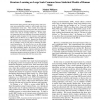Free Online Productivity Tools
i2Speak
i2Symbol
i2OCR
iTex2Img
iWeb2Print
iWeb2Shot
i2Type
iPdf2Split
iPdf2Merge
i2Bopomofo
i2Arabic
i2Style
i2Image
i2PDF
iLatex2Rtf
Sci2ools
142
click to vote
AAAI
2008
2008
Structure Learning on Large Scale Common Sense Statistical Models of Human State
Research has shown promise in the design of large scale common sense probabilistic models to infer human state from environmental sensor data. These models have made use of mined and preexisting common sense data and traditional probabilistic machine learning techniques to improve recognition of the state of everyday human life. In this paper, we demonstrate effective techniques for structure learning on graphical models designed for this domain, improving the SRCS system of (Pentney et al. 2006) by learning additional dependencies between variables. Because the models used for common sense reasoning typically involve a large number of variables, issues of scale arise in searching for additional dependencies. We describe how we use data mining techniques to address this problem and show experimentally that these techniques improve the accuracy of state prediction. We present techniques to improve prediction the unlabeled as well as the labeled variable case. At a high level, we demons...
AAAI 2008 | Additional Dependencies | Common Sense | Intelligent Agents | Sense Probabilistic Models |
Related Content
| Added | 02 Oct 2010 |
| Updated | 02 Oct 2010 |
| Type | Conference |
| Year | 2008 |
| Where | AAAI |
| Authors | William Pentney, Matthai Philipose, Jeff A. Bilmes |
Comments (0)

